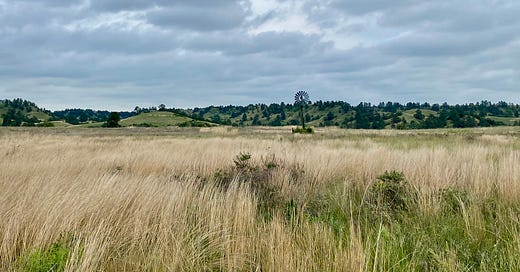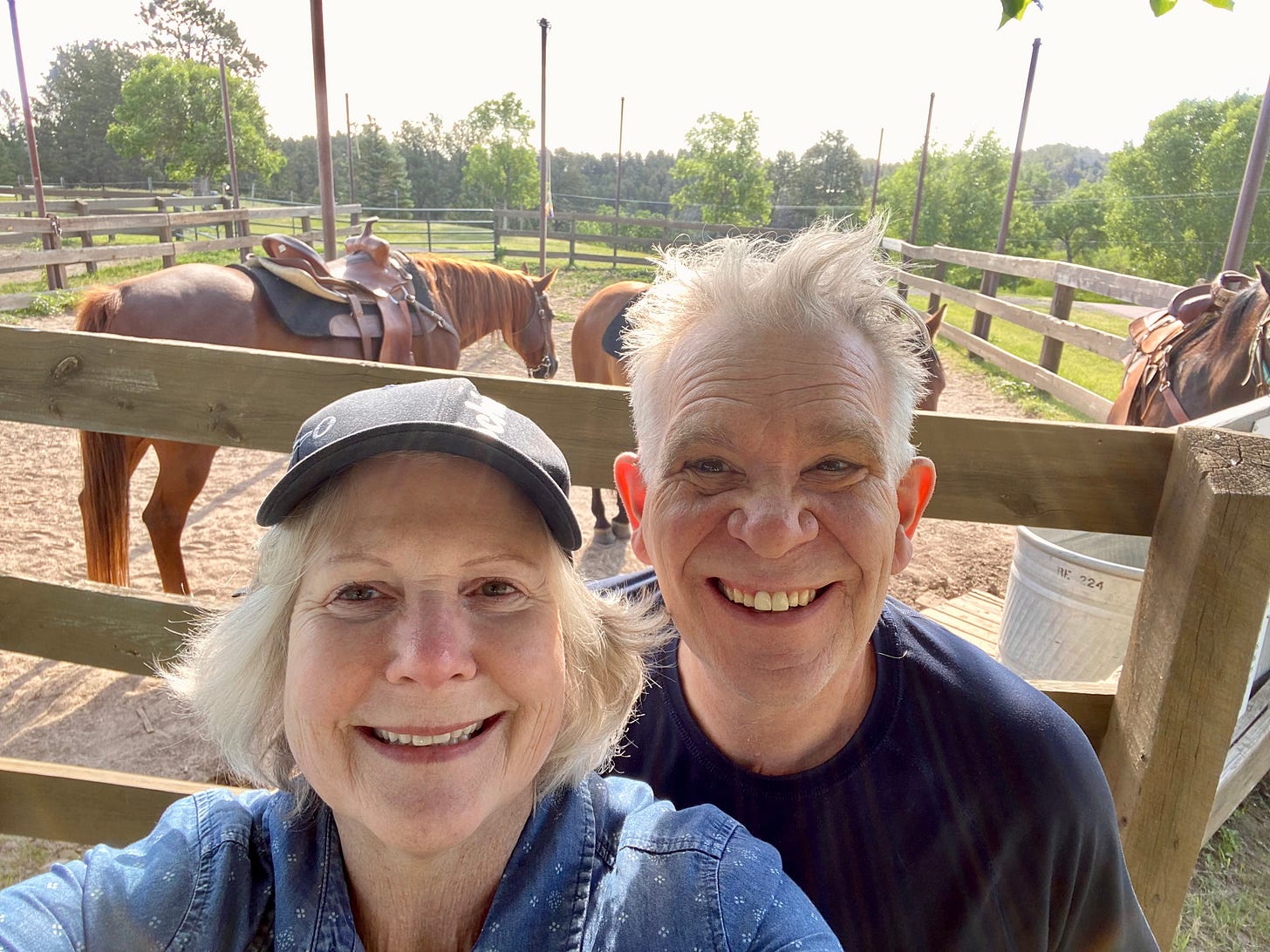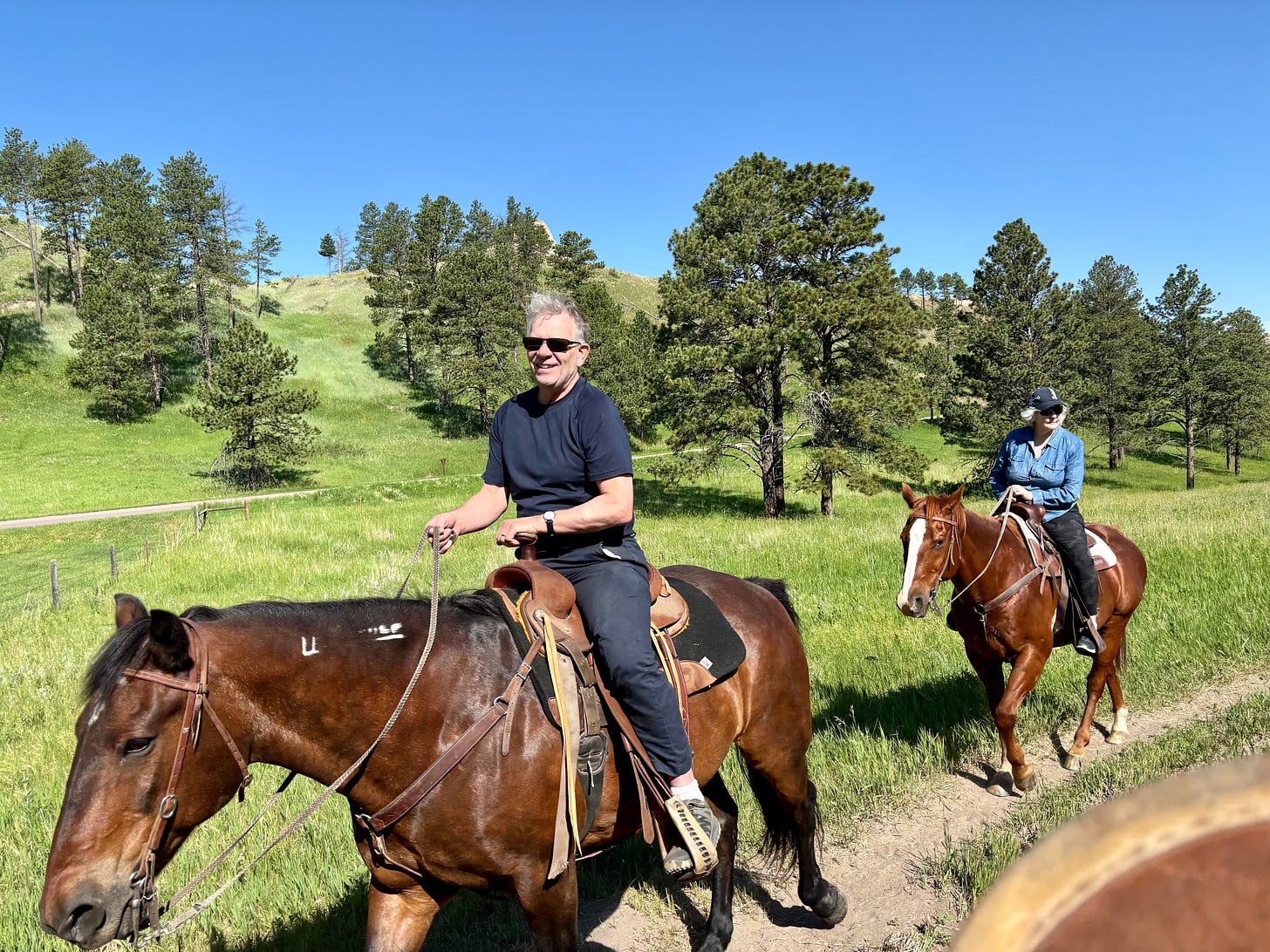Saturday, June 15
This drive is the very definition of an open road — no one before us — no one behind us — just smooth pavement rolling beneath our wheels.
We’re driving west on Route 20 in Nebraska. The land is flat and treeless. As we pass, a cow and her two calves lift their heads from a galvanized water trough at the bottom of a windmill, water dripping from their mouths.
In the afternoon we stop in the town of Gordon. The Antelope Creek Café could use a good cleaning, but it’s a cheerful enough place. Near the door there’s a table full of people who pause their conversation as we enter. Other than them, we’re the only customers.
We order a caramel pecan roll and some cinnamon sugar frybread from a woman who frowns in concentration as she scribbles on her pad.
While we wait I pick up a catalog selling used farm equipment. The cheapest tractors (with 150 to 200 hours of use) cost about $450,000. That’s a lot of money. Good to know.
The caramel roll is soft and delicious but the fry bread is tough.
On our way out someone at the crowded table asks if we’re headed to Virginia.
I say “No, still heading west.”
“Welcome to America,” he replies. The others laugh. I smile and don’t respond. It’s not the first time we’ve heard this in Nebraska.
As we continue west, we see signs that say “Eliminate Property Taxes EPIC.” I look that up online. EPIC is the move to replace property tax with a “consumption tax.”
I watch the acreage scrolling past our windows. Of course EPIC sounds appealing to people who own huge parcels of land.
The ever-changing landscape mesmerizes me. Now it’s hilly, and there are trees again.
We arrive in Chadron State Park. We chose this destination because it has a pool and horseback riding. To our surprise, this State Park turns out to be a sprawling enterprise. There even appears to be a camp and conference center on site.
Picking out a campsite requires a lot of driving around. I remark to Doug that if this facility were in the east, it would be overrun with people. As it is, there feels like plenty of space.
We get to the pool around 3:00. It’s the heat of the day and the place is clamorous with children. They wear water wings or splash around on floats. There’s a large group of Hispanic boys, age 9 to 12 or so, with men who are probably their fathers. Maybe a club of some kind. Poolside, some of the fellas wear T-shirts that say “Bethel Explorer.”
During the lifeguards’ break, the dads entertain the boys by doing bellyflops off the diving boards. The boys hoot and holler. It warms my heart to see them all having such fun together, especially on this Father’s Day weekend.
I am just a bit sad myself. My own father died eight years ago, on Father’s Day, and I always feel the pang of loss on this anniversary.
By 5:00 we are in our campsite and set up. Enjoying a beer in the shade when a neighbor stops by to chat. We invite them to sit down.
Bob and Linda (names changed) are from a small town in Nebraska, where Linda became the postmaster a few years ago. They moved there to be near their grandchildren. Bob was quite talkative and I enjoyed piecing together his history as he told stories. He served in the military right out of high school. After two tours, he bought his own semi truck and was an independent truck driver. After he sold the truck, he drove a school bus for nine years, which he enjoyed.
He told us stories about his father’s family — his father was one of twenty children. Twenty. Almost unbelievable. The family lived in Iowa and were dirt poor. “They kept having babies when they had no business,” Bob said.
Each of the children left home by the age of 13 or 14 because there wasn’t enough money to feed them. There were so many children that the younger ones never met their older siblings, until recently.
“The boys all joined the military. The girls were all wild.”
As it tends to do in campgrounds, the talk turned to rigs. Bob and Linda were in an obviously new “Imagine” by Grand Design. They admired our smaller rig and shared fond memories of their previous GeoPro, which they had taken to Quartzite, Arizona one winter.
Quartzite is legendary and we’ve never been there, so I asked what they thought of it.
Bob said, “It was great. No problem down there with immigration, nothing like that, all very clean.”
And later when Doug mentioned that we’d traveled in Colorado, Bob asked if we’d been in southern Colorado. He said “I’ve been there and it was very dirty, if you know what I mean.” He looked meaningfully at me, which I pretended to not understand. I just shrugged.
So he said, “I kept a peashooter beside me on the seat of my truck at all times.”
A former military man carries around a weapon because a person with brown skin seems threatening? I’m curious but don’t know how to ask what I most want to know. Why?
Sunday, June 16 (Fathers Day)
We got up early to sign up for a 9:00 horseback ride in Chadron SP. We were afraid the slots would fill up but it turned out that we were the only people on the ride. What a treat!
The horses were beautiful and well kept. Doug’s was a branded mustang named Buddy. That means that at one point he’d been a wild horse. He wasn’t terribly large, but very sturdy. My horse, Scooby, was brown with white patches.
There were two guides on horseback also. Leading us was Kaley, a college student from Sheridan, Wyoming. Taking up the rear was Hayden, a local rancher’s son, still in high school.
The trail was gorgeous, winding along scenic hills among tall fir trees. Crowning the ridge in the distance we could see the strange-looking volcanic ash formations for which the park is famous.
The guides reminded us to let the horses find their own footing, and to lean forward on the uphills and back on the descents. I had never before been on horseback on such a steep trail, unless you count the mule ride at the Grand Canyon. This reminded me of that.
The horses took us up a steep incline to a vista. The Black Hills were shadowy and blue in the distance. Coming down was similarly steep.
I asked Kaley what brought her to Nebraska. She said both of her parents had attended Chadron State College and were teachers. She’s studying to be a teacher and was enthusiastic that Chadron is letting her apply her experience as a para in the local schools to her academic requirements.
Hayden said he lives “on a ranch ten miles down the road.”
Doug said, “Tell me about a day in the life of a rancher.”
Hayden thought for a while and said, “Well. You get up and drink coffee. You bring a couple of hay bales out to the cattle. Water ‘em. Fix some fence. Go home. Then water ‘em again. Fix some more fence. Then the next day you do it all again. Oh! And when there’s calves, you brand ‘em.”
I asked him if he hoped to ranch all his life. He said he intends to learn diesel mechanics. I said that it’s good to have multiple ways to earn money.
I asked “How many acres does a ranch have to be to make money?” And I was surprised at his reply. He said his parents ranch 20 to 25 acres which they lease from the government, but they do pasture rotation with other ranchers, “So it’s complicated.”
He summed it up, “They seem to do okay.”
So the leasing angle is interesting. There are public lands all around us, but some people really benefit from those. Are they the same people who hate all government “interference”? I wonder.
Also, I’ve been thinking a lot about why it’s so green around here. The answer is obvious. It’s the Ogallala aquifer that courses beneath our feet.
But I’m thinking about water differently now, as we pass through this brown and green landscape.
Is all that aquifer water for free? All that precious, precious water.
Water that makes the grass grow. Grass that makes the cattle fat.
Who owns water and sunlight? Beef is a valuable commodity. But what about the raw ingredients?
On a theological level, it bothers me that anyone can own water. Isn’t water a gift from God? Doesn’t everyone need access to water?
Anyway. What a lovely way to spend Father’s Day!
After our ride, we headed into Chadron for breakfast at the Country Kitchen.
Our waitress was an older woman named Pam who asked us if we were traveling through. When we said “Virginia,” she said she’d been born in Norfolk. So of course we knew that one of her parents had been in the Navy.
We were right. Pam had grown up on the move. And then she’d married a man who worked for the railroad, so they lived all over.
I asked, “How did you end up in Nebraska?”
Pam said: “When we were living in Rochester, Minnesota there was a nearby shooting and stabbing for no good reason. Somebody just looked at somebody else wrong.”
Note the story quality of that.
Both a shooting and a stabbing? That seems unlikely.
And assuming there’s no motive because you’re not privy to what it is?
What astounded me was that over our omelets Doug and I had been discussing our conversation with Bob and Linda the previous evening. We had both noticed the factors that drove them to Nebraska. At least one factor was fear of people with brown skin.
Then, as if on cue, Pam shows up with a coffeepot and tells us her back story. Which has the exact same theme.
It was a moment of insight for me. For the first time I really understood, on a gut level, why people escape to majority-white places like Nebraska.
They are afraid of people of different skin colors.
Perhaps I’m especially attuned to this dynamic because I have worked hard to heal my own race-related wounds. (If you’re curious, read my memoir, RUINED.)
(We googled the results of the 2020 election. Wanna guess the percentage of Nebraskans who voted for Trump? Yep, the number begins with a nine. Then google the percentage of POC in Nebraska.)
If you know anything about what water costs in Nebraska — please comment below!






I can appreciate not wanting to be impolite, but when faced with bigotry - or being asked to align with bigotry - isn't it really important to speak up? I mean, when he said it was "dirty" in Southern CO was he saying that there were a lot of Mexican immigrants there? If so, wouldn't you want to say, "oh, I have family members that are of Mexican heritage so I don't appreciate that kind of talk."
Interesting!